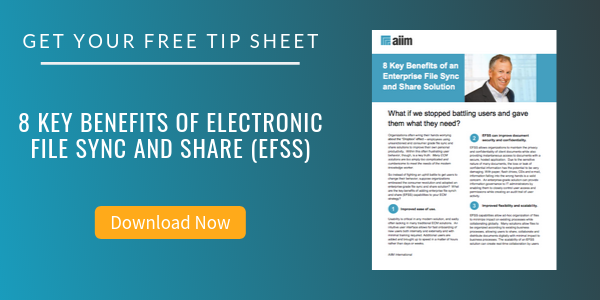
3 Reasons Why You Need to Pay Attention to Unsanctioned File Sharing
Enterprise File Sync and Share (EFSS)
Are your employees using file sharing tools that you don’t want them to use?
If so, you are not alone. In fact, 65 percent of organizations surveyed reported that they are aware that their employees are using unsanctioned file sharing tools, according to a new AIIM research report. And the fact that the other 35 percent said they are “not aware” of employees using unsanctioned tools is not necessarily reassuring, as this is not an indication that it’s not happening.
The issues revealed in this research report are all very real. In order of impact, these are the top concerns organizations have when it comes to sharing content:
Issue 1: Lack of visibility into what’s being shared and where it is located
The top concern – identified by 60 percent of respondents – is a lack of visibility into what users are sharing and accessing.
Unsurprisingly – and likely related to this lack of insight – legal and audit implications were the second largest area of concern, as organizations cannot prove the location of or report on information that they can’t see.
Issue 2: Inability to control who is sharing and accessing your information
A second major challenge identified in the report is the inability to control who is sharing information outside the organization (i.e., employees signing up for online file sharing tools using personal email accounts, etc.). Indeed 49 percent of respondents identified this as a critical issue.
I don’t think it’s any coincidence that the EXACT same number of people, 49 percent, cited that they are also concerned about employees retaining access to sensitive or proprietary information after they leave the organization.
That’s a scary prospect, especially when your industry is governed by strict compliance regulations regarding the handling of certain data. Data that potentially disgruntled ex-employees should NOT retain access to include things like patient information, credit card details, customer data, company-owned intellectual property, merger information, financial data, and anything else of a proprietary nature.
Issue 3: Risk of granting unintentional access
The third major issue circles around the idea of what happens after a user has shared a link to a document or folder. About 40 percent of respondents expressed concern around the concept of shared links never expiring, increasing the risk of compromising data, as well as shared links being accessible to anyone who gains access to these links.
Overcome these issues with education
Clearly, there are several good reasons why you can’t ignore issues related to cloud-based document sharing. According to the AIIM study, the top recommendation for addressing this problem can be boiled down to one simple but powerful word: EDUCATION.
By educating your employees on the risks of sharing using unsanctioned tools, you’re taking a giant step toward a safe, secure file sharing strategy.
About John Mancini
John Mancini is the President of Content Results, LLC and the Past President of AIIM. He is a well-known author, speaker, and advisor on information management, digital transformation and intelligent automation. John is a frequent keynote speaker and author of more than 30 eBooks on a variety of topics. He can be found on Twitter, LinkedIn and Facebook as jmancini77. Recent keynote topics include: The Stairway to Digital Transformation Navigating Disruptive Waters — 4 Things You Need to Know to Build Your Digital Transformation Strategy Getting Ahead of the Digital Transformation Curve Viewing Information Management Through a New Lens Digital Disruption: 6 Strategies to Avoid Being “Blockbustered” Specialties: Keynote speaker and writer on AI, RPA, intelligent Information Management, Intelligent Automation and Digital Transformation. Consensus-building with Boards to create strategic focus, action, and accountability. Extensive public speaking and public relations work Conversant and experienced in major technology issues and trends. Expert on inbound and content marketing, particularly in an association environment and on the Hubspot platform. John is a Phi Beta Kappa graduate of the College of William and Mary, and holds an M.A. in Public Policy from the Woodrow Wilson School at Princeton University.



